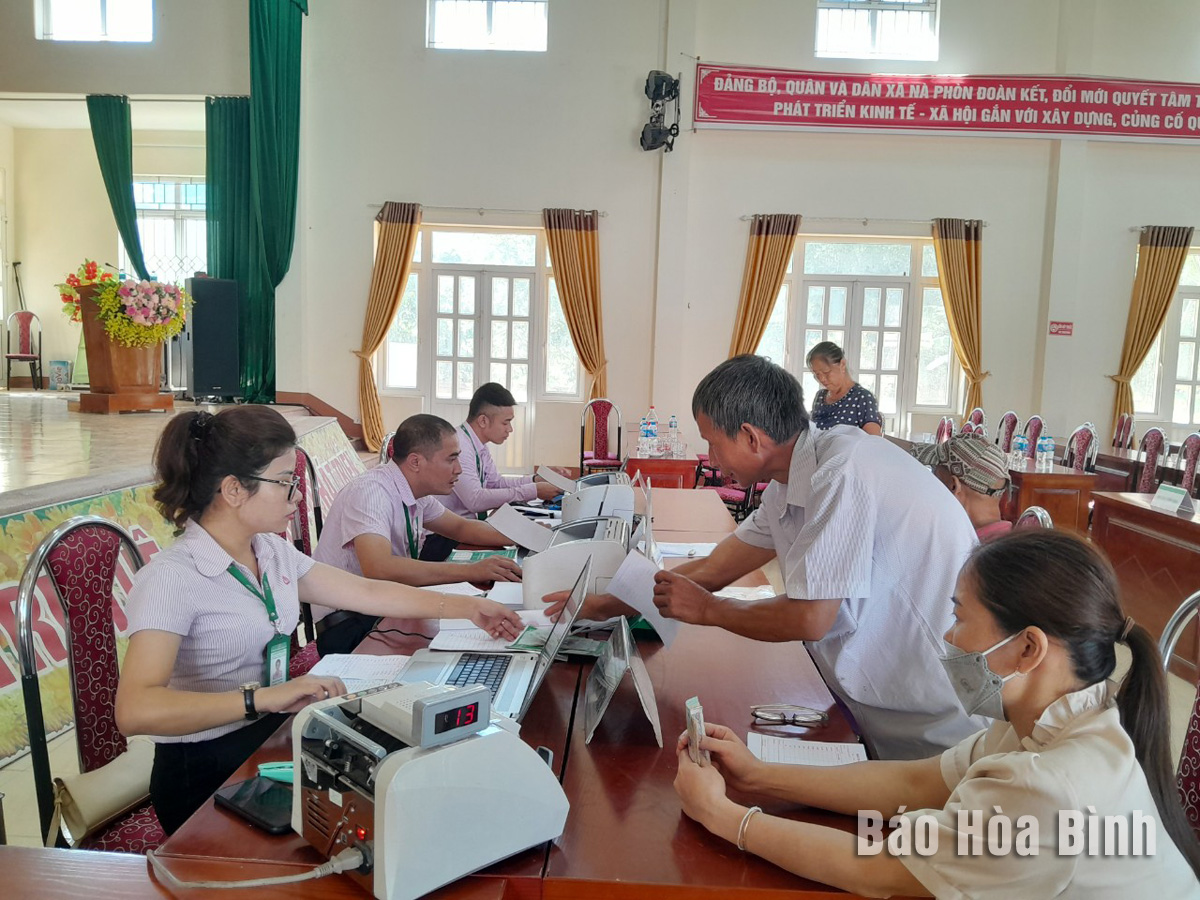
Decree No. 28/2022/ND-CP of the Government on preferential credit policies to implement the national target programme for socio-economic development in mountainous and ethnic-inhabited areas for the 2021 - 2030 period (Phase I from 2021 – 2025) is opening up opportunities to improve the lives of people in these areas in Hoa Binh province in general and Mai Chau district in particular. Since the decree was issued, the transaction office of the Vietnam Bank for Social Policies in Mai Chau district has closely coordinated with local authorities at all levels to drastically direct the review and approval of lists of beneficiaries, and disburse loans.

Staff of the Vietnam Bank for Social
Policies’ transaction office in Mai Chau district conduct procedures to
disburse capital to people in Na Phon commune.
Mua A Trang, Pa Hang Lon hamlet, Pa Co
commune, shared: "My family has six members, the whole family only
depended on 2,000 m2 of hill land to grow maize, even though we worked hard all
year round, we could not get rid of poverty. In August 2023, after the head of
the savings and loan group disseminated a new loan source according to Decree
No. 28/2022/ND-CP of the Government, my family borrowed 100
million VND (4,100 USD). From this capital, I bought three cows and built a
farm. Currently, family members take turns caring for the cows, because they
are the hope to help my family get rid of poverty in the near future."
From 2022 to the end of October 2023, the
transaction office has disbursed 3.34 billion VND to 43 poor households to
support job change, including 19 in Son Thuy commune, eight in Thanh Son, six
in Cun Pheo, five in Na Phon, three in Pa Co and two in Hang Kia.
Currently, the office continues to
coordinate with relevant agencies, and party committees and authorities at the
commune level to monitor the use of loans, review and prepare lists of
households in need of loans which have sufficient conditions to borrow loans
for the following years, thus contributing to bringing policies into life to
help mountainous and ethnic-inhabited areas to get rid of poverty, change
lives, and actively contribute to the effective implementation of national
target programmes in the district.
The Standing Board of the Hoa Binh provincial Party Committee met on March 18 to review and guide major investment projects aimed at boosting local socio-economic development.
The air is thick with the hum of drills and the clatter of machinery as the Hoa Binh – Moc Chau expressway takes shape amid the rugged terrain. Welding sparks illuminate the faces of workers, and concrete mixers churn relentlessly, laying fresh pavement on the newly-carved road. The construction site buzzes with a palpable sense of urgency, particularly in Hoa Binh province where the expressway's future is being forged.
The northern province of Hoa Binh, with over 467,000 hectares of natural forest and more than 100,000 hectares of production forest, holds significant potential for carbon credit market development.
Replacing substandard houses with more sturdy ones by June 30 is the direction given by Nguyen Phi Long, alternate member of the Party Central Committee and Secretary of the Hoa Binh provincial Party Committee, at a meeting held in early March by the provincial Steering Committee for the programme to eliminate temporary and dilapidated houses for the needy.
Recognising digital transformation as an inevitable trend, authorities and agencies in Hoa Binh have made great efforts in the work by focusing on three core pillars - digital government, digital society, and digital economy, resulting in enhanced competitiveness, improved investment climate, and ensured economic and social welfare.
In recent years, Da Bac district has improved administrative reform with a one-stop shop mechanism, streamlined inter-agency procedures, and a shift to digital platforms. These efforts have enhanced public service efficiency and contributed to local socio-economic development.



